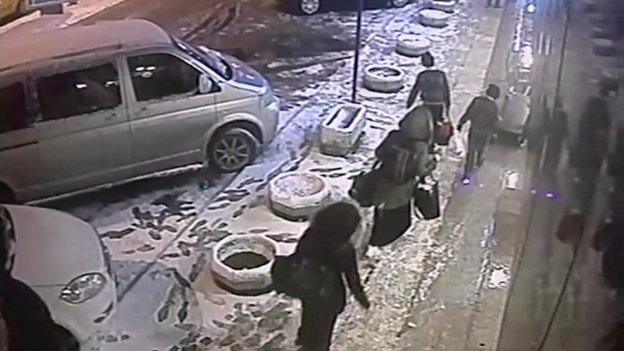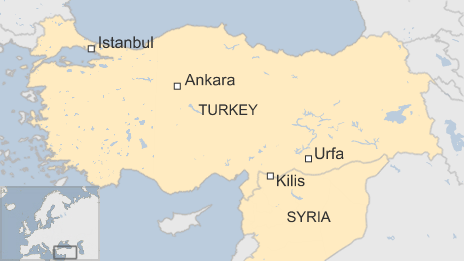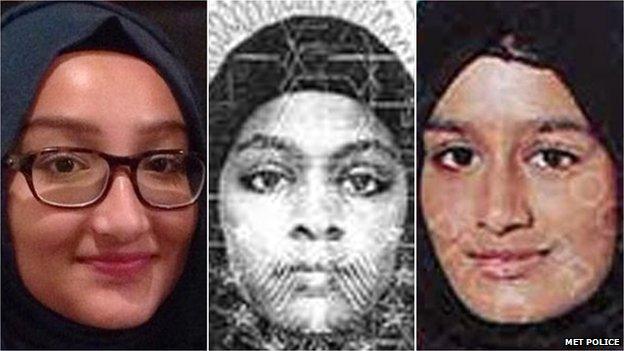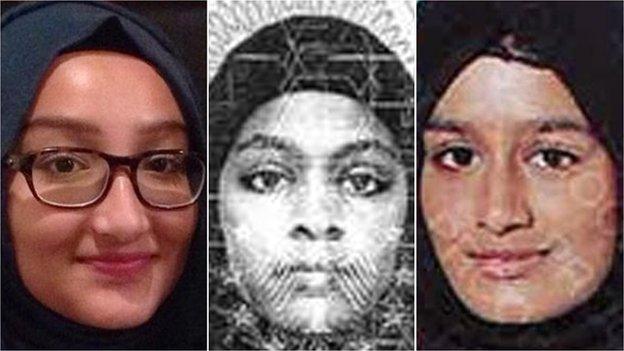Syria girls: CCTV shows UK teenagers at Istanbul bus station
- Published
CCTV shows the girls at the bus station in Istanbul, as James Reynolds reports
New CCTV pictures appear to show three UK schoolgirls on the Turkish leg of what is believed to have been their journey to join Islamic State in Syria.
Shamima Begum and Amira Abase, both 15, and Kadiza Sultana, 16, flew from London to Istanbul on 17 February.
The images show them waiting at Bayrampasa bus station later that day.
Scotland Yard believes the Bethnal Green Academy students are now in Syria. They are thought to have been met at the border by IS militants.
The BBC understands the girls waited in the offices of two bus companies at the station before taking a bus to Urfa, close to the Syrian border, on 18 February.
From there, they are thought to have been driven to a border crossing point by people-smugglers.

The girls are thought to have waited at the bus station for 18 hours
Time codes on the CCTV images suggest the girls were at the bus station - which is on the European side of Istanbul - for nearly 18 hours.
The five images were taken between 20:27 local time (18:27 GMT) on 17 February and 13:22 (11:22 GMT) on 18 February.
BBC correspondent James Reynolds in Gaziantep, south-east Turkey, has been told by a man claiming to be a people-smuggler that the girls were driven to the Syrian border.
The man, who called himself Ali Kathem, said the teenagers then walked the few steps into Syria.
A group of waiting IS men "immediately picked them up with cars", he said.
They had flown from London's Gatwick Airport to Turkey after telling their parents they were going out for the day.
The girls' families have made a number of emotional appeals for them to return home.

The girls are thought to have taken a bus to Urfa, close to the Syrian border
Police have revealed about 60 women and girls are now thought to have travelled from the UK to Syria - including about 22 in the last year.
"When I say young, all but four of those 22 were aged 20 or younger," Deputy Assistant Commissioner Helen Ball, the UK's senior national co-ordinator of counter-terrorism, told BBC One's Andrew Marr Show.
"The last five who have travelled were aged 15 and 16, so this is a growing problem and it is one of real concern.
"The more everyone involved in travel understands this problem and can be alerted and can be vigilant and can look out for people, the better," she added.
The Syrian civil war has had a "galvanising" effect on people becoming radicalised, she said.
'Younger and younger'
Kalsoom Bashir, co-director of the counter-extremism organisation Inspire, said it was "shocking but not surprising" that young girls were being lured to Syria.
She said IS had a "very specific campaign" to target young and vulnerable women, saying here was a growing tend of women who were getting "younger and younger".
Their campaign targets young women by "hooking into their vulnerabilities," she told the programme.
Girls such Shamima Begum, Amira Abase and Kadiza Sultana were victims of "ideological grooming" by IS, she added.

From left: Kadiza Sultana, Amira Abase and Shamima Begum left the UK in mid February
Turkey's Deputy Prime Minister Bulent Arinc has said officials would have taken "necessary measures" to intercept the girls had they known about them earlier.
Scotland Yard has denied taking three days to inform officials in Turkey about the girls' planned journey.
It said it had started working with Turkish authorities a day after the girls went missing.
They had been studying for their GCSEs. A fourth girl from the school is believed to have travelled to Syria in December.
The school has denied the girls could have been radicalised there.

- Published25 February 2015

- Published24 February 2015

- Published24 February 2015
